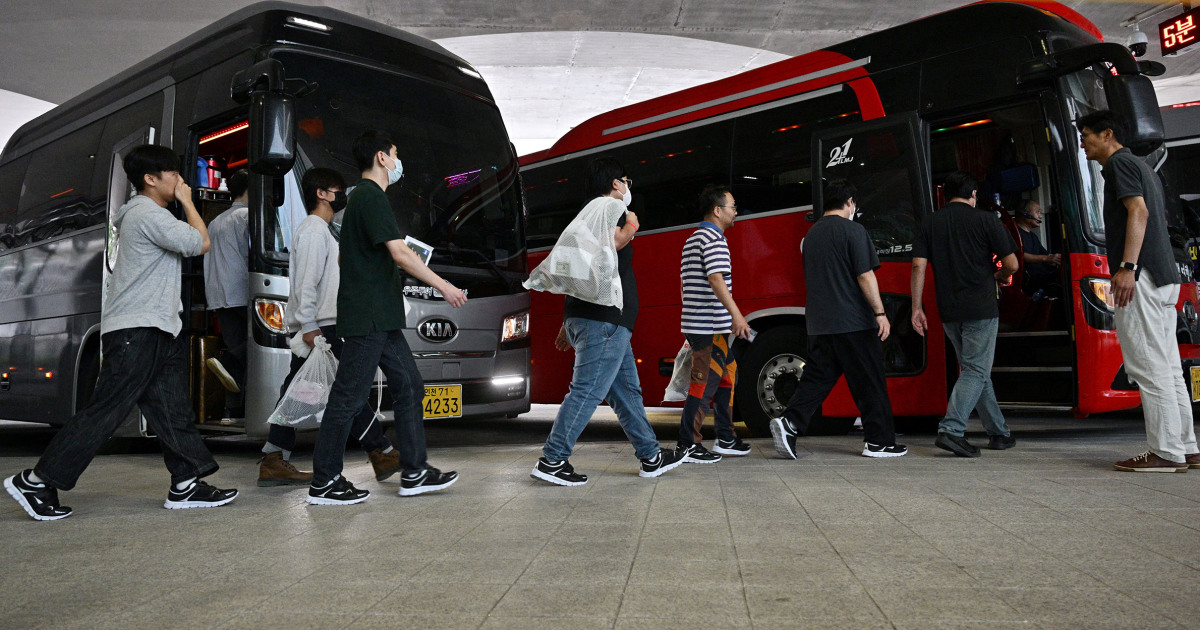Labor Dispute at U.S. Investment Project Raises Sustainable Development Concerns
Incident Overview
- A raid on a major South Korean-owned battery plant in the U.S. was conducted by federal officials on September 4, targeting alleged unlawful employment practices.
- Approximately 475 individuals were detained, including 317 South Korean nationals.
- According to U.S. Immigration and Customs Enforcement (ICE), the detentions were based on allegations of illegal employment and visa violations.
Implications for SDG 8: Decent Work and Economic Growth
- The incident presents a significant challenge to the principles of SDG 8 (Decent Work and Economic Growth), which advocates for productive employment and decent work for all.
- The allegations of unlawful labor practices, if substantiated, represent a failure to protect labor rights and ensure a secure working environment, particularly for migrant workers.
- This situation highlights the critical need to balance the economic growth spurred by foreign investment with the fundamental requirement of upholding decent work standards.
Impact on Global Partnerships and Equality (SDG 10, 16, & 17)
- Strained International Relations: The raid has created diplomatic tension, with South Korean President Lee Jae Myung expressing concern that it could discourage future investment. This friction undermines the collaborative spirit of SDG 17 (Partnerships for the Goals).
- Migrant Worker Vulnerability: The detention of a large contingent of foreign workers underscores the precarious position of migrant laborers and points to challenges in achieving the targets of SDG 10 (Reduced Inequalities), which includes facilitating safe and regular migration.
- Justice and Institutional Accountability: The enforcement action raises questions regarding the application of law and due process, engaging the principles of SDG 16 (Peace, Justice, and Strong Institutions).
Perspectives on Sustainable Industrialization and Knowledge Sharing (SDG 9)
- The investment in a battery plant aligns with the objectives of SDG 9 (Industry, Innovation, and Infrastructure) by contributing to modern, sustainable industrialization.
- U.S. leadership has acknowledged the value of foreign expertise for developing domestic capabilities in complex manufacturing, such as semiconductors and chips, viewing it as a mechanism for knowledge transfer.
- This event underscores that for industrialization to be truly sustainable, it must integrate ethical labor practices and robust international cooperation alongside technological and economic advancement.
Diplomatic and Economic Outlook
- A South Korean trade envoy’s visit to the U.S. to finalize a tariff deal indicates that high-level dialogue continues despite the tensions.
- The resolution of this labor dispute will be crucial for reinforcing the alignment of trade, investment, and labor policies with the holistic framework of the Sustainable Development Goals.
Analysis of the Article in Relation to Sustainable Development Goals
1. Which SDGs are addressed or connected to the issues highlighted in the article?
SDG 8: Decent Work and Economic Growth
The article’s core subject revolves around a large-scale foreign investment project, employment practices, and the economic relationship between two nations. The raid on the battery plant due to “unlawful employment practices” and the detention of workers directly challenge the principles of decent work. Furthermore, the discussion about the potential impact on “future investment into the U.S.” highlights the connection between labor practices and sustainable economic growth.
SDG 10: Reduced Inequalities
This goal is relevant as the article deals with the status and rights of migrant workers. The detention of 475 people for “working illegally or had overstayed their visas” points to issues within migration systems and the vulnerability of migrant populations. Target 10.7, which aims to “facilitate orderly, safe, regular and responsible migration,” is particularly pertinent to the situation described.
SDG 5: Gender Equality
The article provides a specific gender breakdown of the detained South Korean workers, stating there were “307 men and 10 women.” This data, although limited, touches upon the gender dimensions of migrant labor in specific industries and connects to the broader goal of understanding and ensuring equality in economic participation.
SDG 17: Partnerships for the Goals
The entire context of the article is the bilateral relationship between South Korea and the United States. It mentions a “top trade envoy” and the negotiation of a “tariff deal,” which are clear examples of international partnerships. The investment project itself represents a public-private partnership on an international scale, and the diplomatic fallout from the raid underscores the complexities of maintaining such partnerships.
2. What specific targets under those SDGs can be identified based on the article’s content?
Targets under SDG 8: Decent Work and Economic Growth
- Target 8.8: “Protect labour rights and promote safe and secure working environments for all workers, including migrant workers, in particular women migrants, and those in precarious employment.” The raid was initiated to investigate “allegations of unlawful employment practices,” and the detained individuals were migrant workers, making this target directly applicable.
- Target 8.5: “By 2030, achieve full and productive employment and decent work for all women and men…” The situation described, involving illegal employment and visa violations, is the antithesis of the “decent work” promoted by this target.
Targets under SDG 10: Reduced Inequalities
- Target 10.7: “Facilitate orderly, safe, regular and responsible migration and mobility of people, including through the implementation of planned and well-managed migration policies.” The detention of workers for overstaying visas or working without proper authorization is a direct consequence of issues related to migration policies and their enforcement, which this target aims to address.
Targets under SDG 17: Partnerships for the Goals
- Target 17.10: “Promote a universal, rules-based, open, non-discriminatory and equitable multilateral trading system…” The mention of the two countries working to “hash out the final details of a tariff deal” directly relates to the promotion of a rules-based trading system.
3. Are there any indicators mentioned or implied in the article that can be used to measure progress towards the identified targets?
Yes, the article contains both explicit and implicit indicators.
Indicators for SDG 8 (Decent Work and Economic Growth)
- Number of detained migrant workers: The article explicitly states, “About 475 people… were detained.” This figure serves as a direct indicator of labor rights enforcement and issues in a specific workplace.
- Gender breakdown of the workforce: The article specifies that among the South Koreans detained were “307 men and 10 women.” This data can be used as an indicator to analyze the gender composition of migrant labor in this sector, relevant to Target 8.8.
- Level of Foreign Direct Investment (FDI): This is an implied indicator. The article mentions “one of South Korea’s biggest U.S. investment projects” and President Lee’s concern that the raid would “discourage future investment,” linking labor enforcement actions to FDI flows.
Indicators for SDG 10 (Reduced Inequalities)
- Number of migrants detained due to administrative status: The article states that those arrested were “either working illegally or had overstayed their visas.” This number (475) is a direct indicator of the outcomes of migration policy enforcement, relevant to measuring progress toward Target 10.7.
4. Summary Table of SDGs, Targets, and Indicators
| SDGs | Targets | Indicators |
|---|---|---|
| SDG 8: Decent Work and Economic Growth | 8.8: Protect labour rights and promote safe and secure working environments for all workers, including migrant workers. |
|
| SDG 10: Reduced Inequalities | 10.7: Facilitate orderly, safe, regular and responsible migration and mobility of people. |
|
| SDG 17: Partnerships for the Goals | 17.10: Promote a universal, rules-based, open, non-discriminatory and equitable multilateral trading system. |
|
| SDG 5: Gender Equality | 5.5: Ensure women’s full and effective participation and equal opportunities… in economic… life. |
|
Source: nbcnews.com







